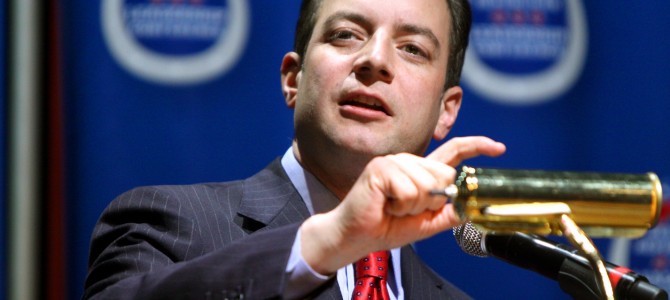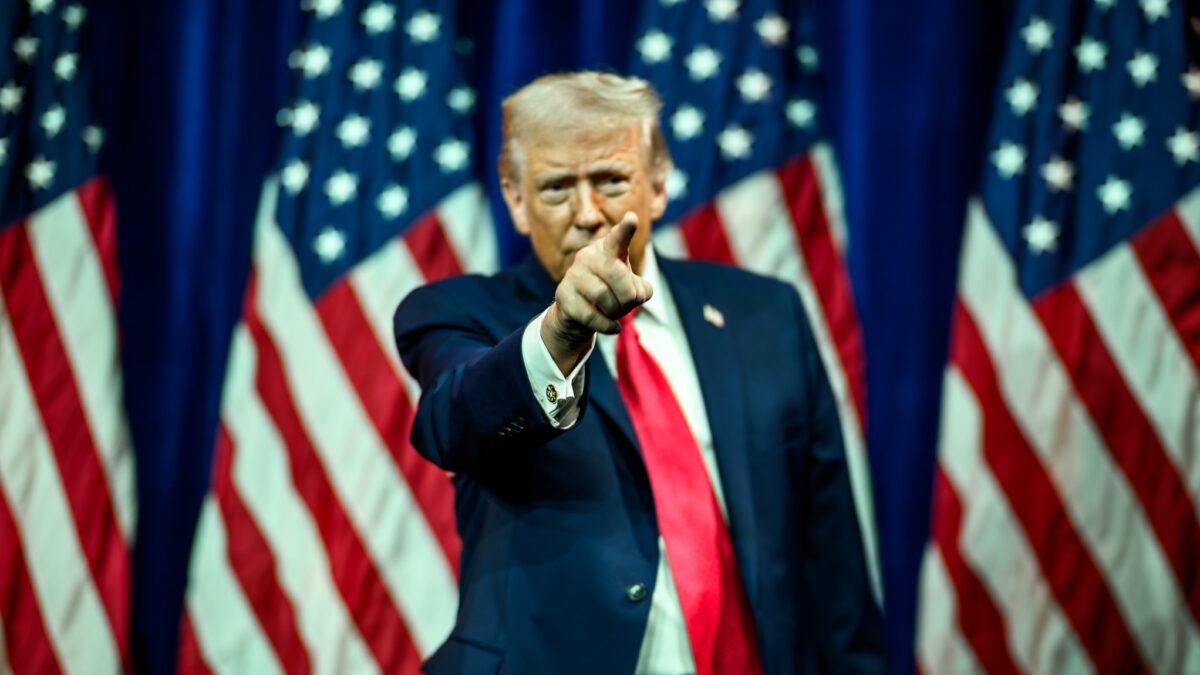
The Republican Party has fallen in line behind Donald Trump since he clinched the party’s nomination for president on May 4. In historical perspective, this isn’t surprising: this is what parties typically do when a nominee emerges. It is surprising this year, both because of the depth of opposition to Trump from within his own party, and because the party’s embrace of Trump is an obvious, avoidable, epic blunder.
Embracing Trump, as almost all the party’s leaders have done, is a colossal, world-historical, vast mistake; an inexplicable failure of moral courage; and a repugnant act of institutional suicide. It is shocking to see such rampant self-destruction sweep through the ranks of a once-great party.
Roll Call of Surrender
The Republican Party as an institution has embraced Donald Trump. Before his last opponents dropped out of the race on May 4, only one sitting senator (Jeff Sessions) had endorsed Trump. Twelve have since indicated that they support the nominee. The same holds across all categories of elected officials (according, I am ashamed to admit, to this very helpful Wikipedia page): Eleven current U.S. representatives endorsed him before, at least 43 have done so since; as have 13 governors, compared to just three beforehand.
Two former Republican vice presidents—Dick Cheney and Dan Quayle—have endorsed him. Several of Trump’s primary rivals, including Bobby Jindal and Rick Perry, have embraced him. Worst of all, even Marco Rubio and Paul Ryan, two of the Republicans I admire most, are awkwardly trying to straddle the fence. Even Lindsey Graham sounds like he is wavering.
The last man standing is freshman Sen. Ben Sasse of Nebraska—who of course is now coming under attack by the party for his principled stand. Sasse is living proof that the rest of the party’s surrender is a conscious choice, not an inevitability, and they cannot allow such a rebuke to go unanswered. Sasse is single-handedly writing a new autobiographical chapter for the next edition of “Profiles in Courage,” and he is almost the only elected Republican left with the credibility to rebuild a post-Trump political movement.
The most damning observation is that the only other Republicans who have withheld their endorsement from Trump are Mitt Romney, George W. Bush, and George H. W. Bush—men whose careers are over and who literally have nothing to lose. Everyone with skin in the game has let expediency triumph over principle.
Unity Through Conquest
The Republican Party is not “unifying.” It is surrendering. “Unity” conjures up an image of coming together, of a mutual embrace, of two equal parties compromising for the greater good. No such embrace is happening here except, perhaps, the embrace of wrestlers, locked in combat and sprawled across the ground, one with the contemptuous grin of spiteful victory and the other with a pathetic and groveling appeal for mercy. Trump is not adapting the ideology of conservatism and limited government. He is replacing it.
By embracing Trump, the Republican Party embraces the man, the ideas, and his fate. Whatever legitimate grievances underlie Trump’s appeal—such as frustration with the pace of globalization, or with the culture of political correctness—have been tarnished by Trump’s overt hostility to basic norms of republican government. The party has given away all the high ground it had against the increasingly illiberal and autocratic progressive left by nominating the only person in America who embodies an equally clear disregard for equality under law.
If Trump loses—which he probably will—the Republican Party will lose with him, and it will deserve its loss. The down-ticket damage will be all of Trump’s doing, with the party’s open complicity, and much of the gains at the state and local level in recent years will be undone.
It is worse if Trump wins (and I think he has a higher chance of winning than most polls say): a Trump victory vindicates Trumpism—already dangerously on the rise—and permanently transforms the Republican Party into the party of white grievance, nativism, and belligerent nationalism. America will no longer have a party of limited government and classical liberalism. Losing the presidency but recovering a party dedicated to the ideals of ordered liberty is far preferable.
A Failure of Strategery
What is baffling is that the strategic calculus is so obvious, yet the entire party is getting it so massively wrong. That they are getting it so wrong is evidence that they are wholly driven by short-sighted, tactical partisan interests. They want the Republican Party to win and they want to be reelected. This isn’t a shocking insight; it is exactly what elected politicians do.
But what surprises me is that they want the Republican Party to win no matter what the party stands for, even if the party flirts with white supremacy and proto-fascism. I held out the hope—now, I see, hopelessly deluded and naïve—that politicians understood that there is a line you don’t cross; there comes a point at which principle really does come before party; that the good of the nation should come before partisanship; and that when your party starts to go off the deep end, you jump ship.
I thought, because of the #NeverTrump movement and the Shermanesque denunciations of Trump throughout the primary campaign—like Perry’s—that the party understood Trump’s nomination was such a line. I thought they perceived the existential threat his ideas pose to limited government and to the American ideals of a free and open society. Certainly, many people now endorsing Trump said exactly that, and I took them at their word.
Some people now getting on the Trump train argue Trump can change his tone, learn, adapt, act more presidential. This is Republican National Committee Chairman Reince Priebus’ approach. First, no, Trump can’t and won’t “act presidential.” Second, if you have a candidate who needs to work at “acting” presidential, you’re doing it wrong.
Candidates shouldn’t have to “act” presidential; you should elect them because they are presidential. Third, if he miraculously manages to put on the act for a few weeks, you would be supremely gullible to believe it. If you do, you were probably secretly rooting for Trump all along and are just looking for an excuse to admit it openly.
But fourth, consider what you’re trying to believe: either Trump was faking his bombast, xenophobia, and illiberalism during the primary, in which case you have to ask: Why would a candidate believe it is to his advantage to pretend to be an American Mussolini? Or the alternative: Trump was genuine then and faking it now, in which case you’re openly rooting for Trump to trick his way into the presidency by lying about his contempt for the norms of democracy.
The Hillary Clinton Argument
The ubiquitous rebuttal: But Trump is better than Clinton. It’s a two-party system—if you don’t vote Trump, if you vote for a third candidate or abstain, you’re wasting your vote and it is the same as voting for Clinton.
It is not a two-party system unless you vote that way. Take the red pill: free your mind. There are a score of other parties in the United States and you and I have every right to vote for any one of them or none at all. If you really want a revolution, try burning down the two-party duopoly. That might usher in real change.
My vote doesn’t belong to the GOP. It is not theirs to lose. They don’t have a presumptive claim to it, as if it starts in their column by right and declining to give it to them requires justification. My vote is mine, and they must earn it by giving me good reasons to believe they are best qualified to govern. I refuse to honor the party of Trump with such recognition.
Not voting for Trump isn’t the same as voting for Clinton, unless I vote for Clinton, which I will not do. Not voting for Trump is a morally meaningful act. It means I can look myself in the mirror, sleep soundly at night, and look my children in the eye with dignity and self-respect.
It means that if and when the country is ready to welcome a new political movement of limited government and human dignity, a few—like Sasse—will be standing ready, unsullied by the catastrophe unfolding around us, ready to replace the nihilist apparatchiks who tried to buy a few more years in power by shilling for a neo-fascist.
This is a morally clarifying moment. Trumpism is unjust, foolish, and un-American. It was wrong before May 4, and it is wrong today. It is appalling—it is obscene—that a political party rooted in civic responsibility, limited government, and ordered liberty has so quickly embraced a strongman demagogue. Andrew Sullivan is right: America is ripe for tyranny. Just because we hold elections and ritualistically cast votes doesn’t make this a self-governing society.









